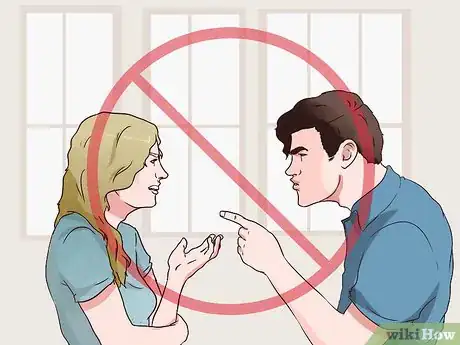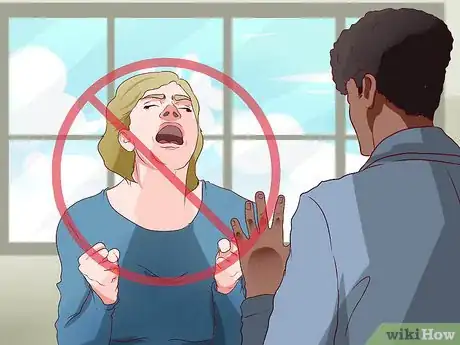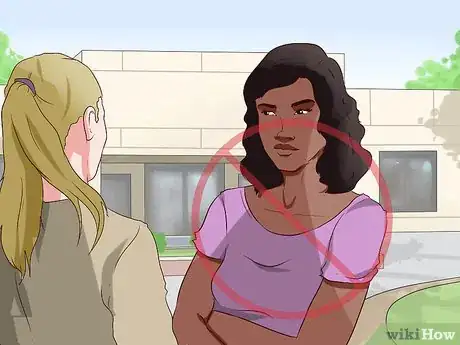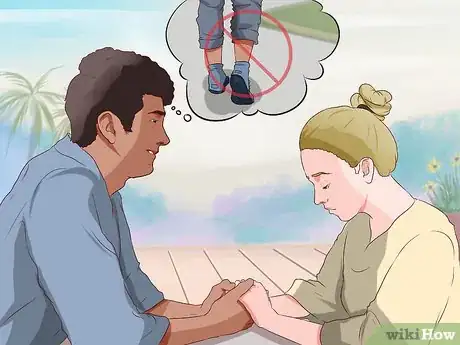This article was co-authored by Katie Styzek. Katie Styzek is a Professional School Counselor for Chicago Public Schools. Katie earned a BS in Elementary Education with a Concentration in Mathematics from the University of Illinois at Urbana-Champaign. She served as a middle school mathematics, science, and social studies teacher for three years prior to becoming a counselor. She holds a Master of Education (M.Ed.) in School Counseling from DePaul University and an MA in Educational Leadership from Northeastern Illinois University. Katie holds an Illinois School Counselor Endorsement License (Type 73 Service Personnel), an Illinois Principal License (formerly Type 75), and an Illinois Elementary Education Teaching License (Type 03, K – 9). She is also Nationally Board Certified in School Counseling from the National Board for Professional Teaching Standards.
There are 11 references cited in this article, which can be found at the bottom of the page.
wikiHow marks an article as reader-approved once it receives enough positive feedback. In this case, 83% of readers who voted found the article helpful, earning it our reader-approved status.
This article has been viewed 153,907 times.
Drama is often related to ego or pride, and some people seem to attract drama to them. It can be hard to stay positive and calm when faced with drama from others. However, by knowing how to defuse the situation and remain calm, and by knowing when to walk away, you can deal with drama effectively.
Steps
Defusing the Situation
-
1Acknowledge your part in the drama. Humility is one of the best ways to defuse drama, as it takes the energy out of someone’s drama. By explaining where the mishap or misunderstanding occurred on your end you can start to defuse the drama. If you did something intentionally, such as “forgetting” to mail an invitation, or refusing to send a thank you note to your mother-in-law, you need to own up to that and explain why you acted the way you did. You’ll also need to offer to make amends, if possible.
- If you made a mistake that led to the drama, you might say, “I misheard you the other day when you said we were meeting at seven. I thought you said eight, and so it’s my fault that I was late to the meeting.”
- If you did something hurtful or unkind that led to the drama, you might say, “I felt that I was being silenced when you said you’d invite whomever you wanted—that’s why I ‘forgot’ to send the invitation to your best friend. It made me feel like my opinion didn’t matter. I can call them to extend the invitation now. It’s not too late.”
-
2Apologize. An apology can go a long way in defusing drama. This goes beyond acknowledging your role, and includes sincere remorse, and often an attempt to ameliorate the situation or offer amends. You should apologize in person, if possible. Subtle cues that let the other person know you are sincere are oftentimes lost in texts or emails.[1]
- You might say, “I’m sorry I said that I thought you weren’t contributing enough. I felt that I was doing a lot and I couldn’t see the behind-the-scenes work you were doing.”
- If you are having trouble with feeling like you ought to apologize, try to conceptualize the other person’s feelings and why they might feel that way. You might also want to reflect on why you’re having trouble. Is it truly because you believe you did nothing to cause the drama or is it because of pride or fear?
Advertisement -
3Don’t feed the drama. This is where you give the other party the reaction they’re looking for. Often, people want, whether they realize it or not, to escalate the drama. They want to feel vindicated for whatever wrong they feel has occurred, even if it is only minor.[2]
- If, for example, you are late to dinner, and they get angry, don’t say, “Well, I would have been on time if it hadn’t been for having to pick up your dry-cleaning.” However true that might be, it will only feed the drama. Instead, you might say, “I see why you might be angry. I know you’re hungry because you had to skip lunch at work, and they were refusing to take your order until your entire party was here. Can I pick up your tab to make up for it?”
-
4Find common ground. Oftentimes, people who create drama feel misunderstood or like people aren’t interested in taking the time to get to know them. If you can find common ground, you may be able to defuse the drama. This means taking the time to reflect on their experience and your experience of the situation and figuring out how you both can reach your goals.[3]
- For instance, if you are making plans with a friend and they say, “You always pick the restaurant. I don’t understand why I can’t choose for once. You always want sushi, and I’m tired of it.” Whether or not this is true isn’t the point. You might respond, “How about we go to the food court at the mall, so we can both get what we want?” By offering something that the other party might find amenable, you can help defuse their anger.
-
5Don’t immediately label something as “drama.” Sometimes you might be tempted to label something as drama when you don’t really want to deal with it. It can create drama to call something “drama” that isn’t. For instance, if your friend is upset because they were harassed by someone on the street, and you say (having witnessed it), “I think you’re just taking it too seriously. Stop making everything so dramatic.” This is dismissive and will likely cause the drama you want to avoid. You should avoid labeling the following as drama:[4]
- When someone discloses a traumatic experience.
- When you are called out for racism, sexism, homophobia, or any type of bigotry.
- When you passionately disagree with a friend about something important to you both.
-
6Recognize the difference between bullying and drama. Drama is typically an overreaction by a friend or acquaintance, whereas bullying is any behavior that is aggressive, unwanted, repetitive, and used to assert power. If you feel you are being bullied, go to a teacher, supervisor, human resource representative, or counselor. Drama can turn into bullying, but not all drama is bullying.[5]
Remaining Calm
-
1Breathe. To deal with drama effectively, you’re going to have to remember to breathe—and deeply. When you breathe deeply, your body works to calm you down physiologically. Take several deep breaths before continuing the confrontation, and keep reminding your self to breathe slowly in the midst of the confrontation. This will help you keep a cool head as you attempt to defuse the drama.[6]
-
2Use “I” statements rather than “you” statements. When you’re in the midst of drama, you might be tempted to use a plethora of “you” statements. Avoid saying something like, “You did this! What were you thinking? You were the one who made this mess. You’re making me very angry.” Instead say, “I feel like you contributed to this situation. I feel angry that you weren’t there when I needed you.”[7]
-
3Be mindful of your own emotions. This means not acting impulsively on every emotion you feel in the moment. Instead, name the emotions to your self and ask yourself, “Are these feelings representative of reality?” If they aren’t, then let them go. If they are, ask yourself what they best way to convey them is, and what you hope to gain by conveying them. This way, you understand what role your emotions are playing in the drama, and whether they are likely to escalate or defuse the drama.[8]
-
4Don’t yell or raise your voice. The tone you use can defuse drama. By keeping your volume at a normal level, you are showing that you are calm even as they try to stoke the flames of the drama.[9] Yelling is a sign that our bodies are physiologically aroused. It can also be damaging to others’ health and wellbeing. So, not only will yelling increase the drama, it hurts people and relationships.[10]
-
5Keep an open and assertive but not aggressive posture. Keep your posture open. This means uncrossing your arms and relaxing the shoulders. This will help to defuse the drama as it sends subtle cues to the other person that you are calm, but assertive. It can unnerve some people who are loud and aggressive on the outside but insecure and fearful on the inside. To avoid being aggressive in your posture, don’t invade other people’s space. You’ll also want to refrain from being rigid in your stance.[11]
Walking Away
-
1Assess the situation. Before walking away from drama, you’ll want to understand what’s going on and if the conflict can be resolved. You’ll want to weigh the various factors, the people involved, the cost of walking away (Will you lose your job? Will you end a friendship?). Assessing the situation should help you gain perspective of what you should do.[12]
-
2Determine whether you’ve given a sincere attempt to defuse it. Sometimes it’s tempting to give up without even trying. Unless there’s a pattern of drama that never seems to get defused (with a co-worker, for instance), you might want to at least give defusing the situation a fair shot.[13]
-
3Walk away from the situation. Sometimes, you may just need to walk away from the situation for a small time. You might both be too emotional to solve the conflict in that moment, or the drama may have distorted the situation. In any case, sometimes everyone needs a breather, especially when the drama is from someone we love.[14]
-
4Assess the type of relationship you have and what you want with the other person. Are they your spouse, a co-worker, a friend or a casual acquaintance. Do you want to work through the drama? You’ll have to discuss this with them, and tell them your feelings. This might create more drama for a period, but that might help you make a decision about whether you want such a toxic person in your life. If you can work through it, then your friendship will be the stronger for it.[15]
-
5Walk away from the relationship, if possible. Sometimes this might mean formally ending a relationship (quitting a job or firing an employee) or simply creating distance between you and a dramatic friend. This is a hard choice, but if someone is constantly being toxic, and causing you emotional distress over small things, you need to evaluate the relationship. [16]
- If someone wants to be friends again and you don't, it's perfectly okay to tell them that. You get to choose your friends, and if you don't want to be friends with someone, no one can force you to do so. You might say, "I'm sorry that I can't be friends with you right now. I've been really hurt by your drama in the past, and I'm not over it. Maybe someday we can be friends again, but not right now."
Expert Q&A
-
QuestionHow should I deal with drama on social media?
 Katie StyzekKatie Styzek is a Professional School Counselor for Chicago Public Schools. Katie earned a BS in Elementary Education with a Concentration in Mathematics from the University of Illinois at Urbana-Champaign. She served as a middle school mathematics, science, and social studies teacher for three years prior to becoming a counselor. She holds a Master of Education (M.Ed.) in School Counseling from DePaul University and an MA in Educational Leadership from Northeastern Illinois University. Katie holds an Illinois School Counselor Endorsement License (Type 73 Service Personnel), an Illinois Principal License (formerly Type 75), and an Illinois Elementary Education Teaching License (Type 03, K – 9). She is also Nationally Board Certified in School Counseling from the National Board for Professional Teaching Standards.
Katie StyzekKatie Styzek is a Professional School Counselor for Chicago Public Schools. Katie earned a BS in Elementary Education with a Concentration in Mathematics from the University of Illinois at Urbana-Champaign. She served as a middle school mathematics, science, and social studies teacher for three years prior to becoming a counselor. She holds a Master of Education (M.Ed.) in School Counseling from DePaul University and an MA in Educational Leadership from Northeastern Illinois University. Katie holds an Illinois School Counselor Endorsement License (Type 73 Service Personnel), an Illinois Principal License (formerly Type 75), and an Illinois Elementary Education Teaching License (Type 03, K – 9). She is also Nationally Board Certified in School Counseling from the National Board for Professional Teaching Standards.
Professional School Counselor Do not engage back and forth with the drama via social media. It usually escalates the situation and makes it worse.
Do not engage back and forth with the drama via social media. It usually escalates the situation and makes it worse. -
QuestionHow can I stop feeling upset about drama that's going on?
 Katie StyzekKatie Styzek is a Professional School Counselor for Chicago Public Schools. Katie earned a BS in Elementary Education with a Concentration in Mathematics from the University of Illinois at Urbana-Champaign. She served as a middle school mathematics, science, and social studies teacher for three years prior to becoming a counselor. She holds a Master of Education (M.Ed.) in School Counseling from DePaul University and an MA in Educational Leadership from Northeastern Illinois University. Katie holds an Illinois School Counselor Endorsement License (Type 73 Service Personnel), an Illinois Principal License (formerly Type 75), and an Illinois Elementary Education Teaching License (Type 03, K – 9). She is also Nationally Board Certified in School Counseling from the National Board for Professional Teaching Standards.
Katie StyzekKatie Styzek is a Professional School Counselor for Chicago Public Schools. Katie earned a BS in Elementary Education with a Concentration in Mathematics from the University of Illinois at Urbana-Champaign. She served as a middle school mathematics, science, and social studies teacher for three years prior to becoming a counselor. She holds a Master of Education (M.Ed.) in School Counseling from DePaul University and an MA in Educational Leadership from Northeastern Illinois University. Katie holds an Illinois School Counselor Endorsement License (Type 73 Service Personnel), an Illinois Principal License (formerly Type 75), and an Illinois Elementary Education Teaching License (Type 03, K – 9). She is also Nationally Board Certified in School Counseling from the National Board for Professional Teaching Standards.
Professional School Counselor If you are feeling very upset, take a relaxing shower, go for a walk, talk to a trusted adult, or write down your feelings.
If you are feeling very upset, take a relaxing shower, go for a walk, talk to a trusted adult, or write down your feelings.
Warnings
- This advice is not meant to replace the advice of a qualified mental health professional.⧼thumbs_response⧽
- If you are caught in an unavoidable situation where you are face to face with the person who has been spreading rumors or who insults you, just remember to keep your cool.⧼thumbs_response⧽
- If someone is abusing you, you can contact the National Domestic Violence Hotline at 1-800-799-7233 or 1-800-787-3224.[17]⧼thumbs_response⧽
References
- ↑ https://www.entrepreneur.com/article/274343
- ↑ http://tinybuddha.com/blog/7-crucial-steps-to-minimize-drama-in-your-life/
- ↑ http://www.monster.com/career-advice/article/how-to-handle-most-common-workplace-conflicts
- ↑ http://tinybuddha.com/blog/7-crucial-steps-to-minimize-drama-in-your-life/
- ↑ https://www.stopbullying.gov/what-is-bullying/index.html
- ↑ http://tinybuddha.com/blog/7-crucial-steps-to-minimize-drama-in-your-life/
- ↑ http://everydayfeminism.com/2014/02/effectively-communicating-feelings/
- ↑ http://everydayfeminism.com/2014/02/effectively-communicating-feelings/
- ↑ https://www.callcentrehelper.com/dealing-with-angry-customers-152.htm
- ↑ https://www.psychologytoday.com/intl/blog/peaceful-parents-happy-kids/201302/10-steps-stop-yelling?quicktabs_5=1
- ↑ http://www.mtstcil.org/skills/assert-3.html
- ↑ http://www.huffingtonpost.com/mike-harden/3-steps-for-dealing-with-_b_5765970.html
- ↑ http://www.talentplus.com/talent-plus-viewpoint-blog/36-culture/642-conflict-management-how-to-handle-interpersonal-conflicts-with-your-colleagues-at-work
- ↑ http://www.huffingtonpost.com/mike-harden/3-steps-for-dealing-with-_b_5765970.html
- ↑ http://tinybuddha.com/blog/7-crucial-steps-to-minimize-drama-in-your-life/
- ↑ http://tinybuddha.com/blog/7-crucial-steps-to-minimize-drama-in-your-life/
- ↑ http://www.thehotline.org/
About This Article
If you're dealing with drama, try your best to stay positive and calm, so you can more easily diffuse the situation. Although other people may encourage you to feed the drama, don't give them the reaction they want and keep your emotions in check. When confronted head-on with drama, begin by acknowledging and apologizing for any role you played in it, then see what you can do to resolve the issue. Since drama often starts from a misunderstanding, try to look for common ground with the other party to see if there's a solution that could make both of you happy. For more advice, like how to tell drama from bullying, read on.










































































